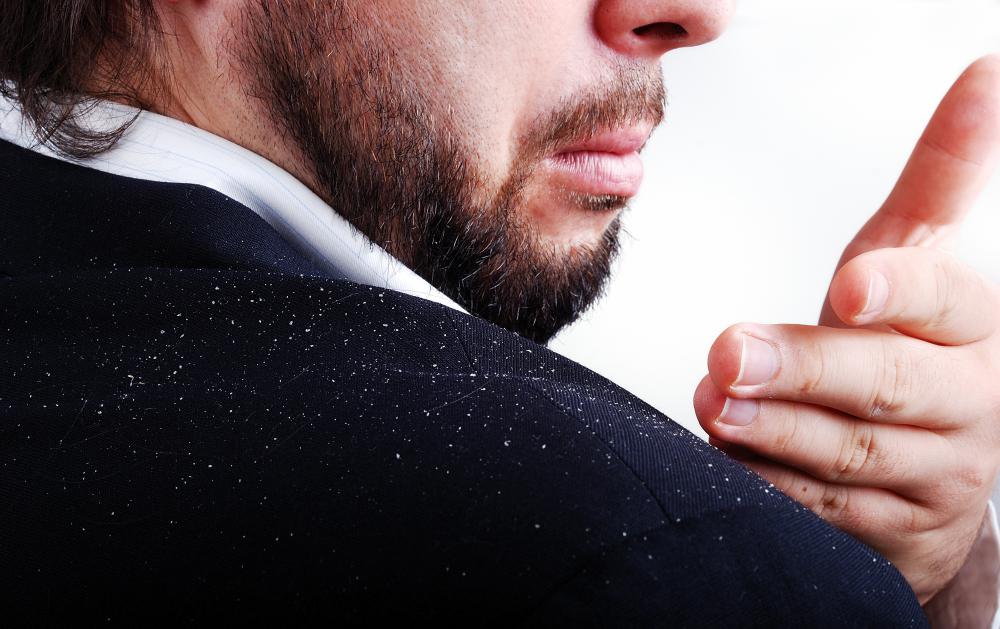At WiseGEEK, we're committed to delivering accurate, trustworthy information. Our expert-authored content is rigorously fact-checked and sourced from credible authorities. Discover how we uphold the highest standards in providing you with reliable knowledge.
What is Anti-Dandruff Shampoo?
It could be safely assumed that no one likes dandruff. Those white or silver flakes on the shoulders are generally assumed to be caused by dry skin. In fact, dandruff is more often caused by excessive oil in the scalp or a yeast infection. Most people, however, are not as concerned about the cause of dandruff as they are with ridding themselves of its visible effects. Thankfully, either an over-the-counter (OTC) or prescription anti-dandruff shampoo can usually take care of the problem in short order.
Virtually all shampoos include a variety of scents, vitamins, moisturizers, and soaps to both clean the scalp and prevent the stripping of natural oils from the hair. An anti-dandruff shampoo will generally include all of these, but with a variety of additional ingredients that may alleviate both dandruff and the scalp problems that cause it. Various ingredients are geared toward correcting different conditions. An anti-dandruff shampoo may contain medicated compounds that help prevent scalp disorders common to those with dandruff.

One such element found in many anti-dandruff shampoos is coal tar. Though its name is less than attractive, coal tar is extremely effective in fighting dandruff. This is especially true when it is massaged into the scalp and allowed to remain in place for at least five minutes. Anyone who uses an anti-dandruff shampoo containing coal tar should avoid direct sunlight after washing his hair. Coal tar tends to make the scalp light sensitive.

Another frequent ingredient found in anti-dandruff shampoos is salicylic acid. This is the same active ingredient found in aspirin, and in higher concentrations is used to eat away warts. It is effective against most conditions that cause dandruff, and aids both in removing dead skin cells and allowing healthy skin cells to grow. Sulfur is also an additive found in anti-dandruff shampoos, working to eliminate any yeast fungus that has attached itself to the scalp.

Some dandruff-controlling shampoos contain fungicides, some contain antiseptics, and many contain both. The most popular anti-bacterial and anti-fungal agent found in this type of anti-dandruff shampoo is known as zinc pyrithione. In certain instances, if a case of dandruff is too severe or does not respond to the OTC products, a person should see his doctor. In most cases, a physician will prescribe a shampoo that contains similar ingredients to the OTC offerings, but in stronger amounts.

Anti-dandruff options do exist for those who prefer to go the more natural route. Sap or oil acquired from the leaves of the Australian melaleuca tree appears to be affective as both an antifungal and antibacterial compound. The sap of the leaves is sold in many natural food or organic health stores, usually labeled as Tea Tree oil. It is becoming increasingly popular as an alternative to chemical based, anti-dandruff shampoos.
AS FEATURED ON:
AS FEATURED ON:















Discussion Comments
Natural anti-dandruff shampoos are not good for everyone. I can't use tea tree oil shampoo because I'm allergic to tea tree oil. Moreover, most natural shampoos contain sodium lauryl sulfate which actually worsens dandruff in some people.
@ddljohn-- I had the same problem. I went through a series of OTC, medicated anti-dandruff shampoos. Some did not work, others worked, but only for a certain period of time.
Then, I switched to natural shampoos with natural anti-fungal and anti-bacterial ingredients. Currently, I'm using nettle shampoo which is excellent for dandruff caused by an excessively oily scalp. It's mild so it doesn't cause irritation but it gets rid of the dandruff. I highly recommend it.
I've also heard excellent things about tea tree oil shampoo for dandruff. So try out a few natural shampoos and see which works best for you.
I've been using an anti-dandruff shampoo with zinc pyrithione for a while now. In the beginning, it was working extremely well. But its effects seem to be lessening with time. It had treated my dandruff at one point but now, it's slowly coming back.
Is this an issue with all anti-dandruff shampoos? What is the best medicated shampoo for dandruff? Is there one that treats dandruff completely and prevents it from coming back?
Post your comments